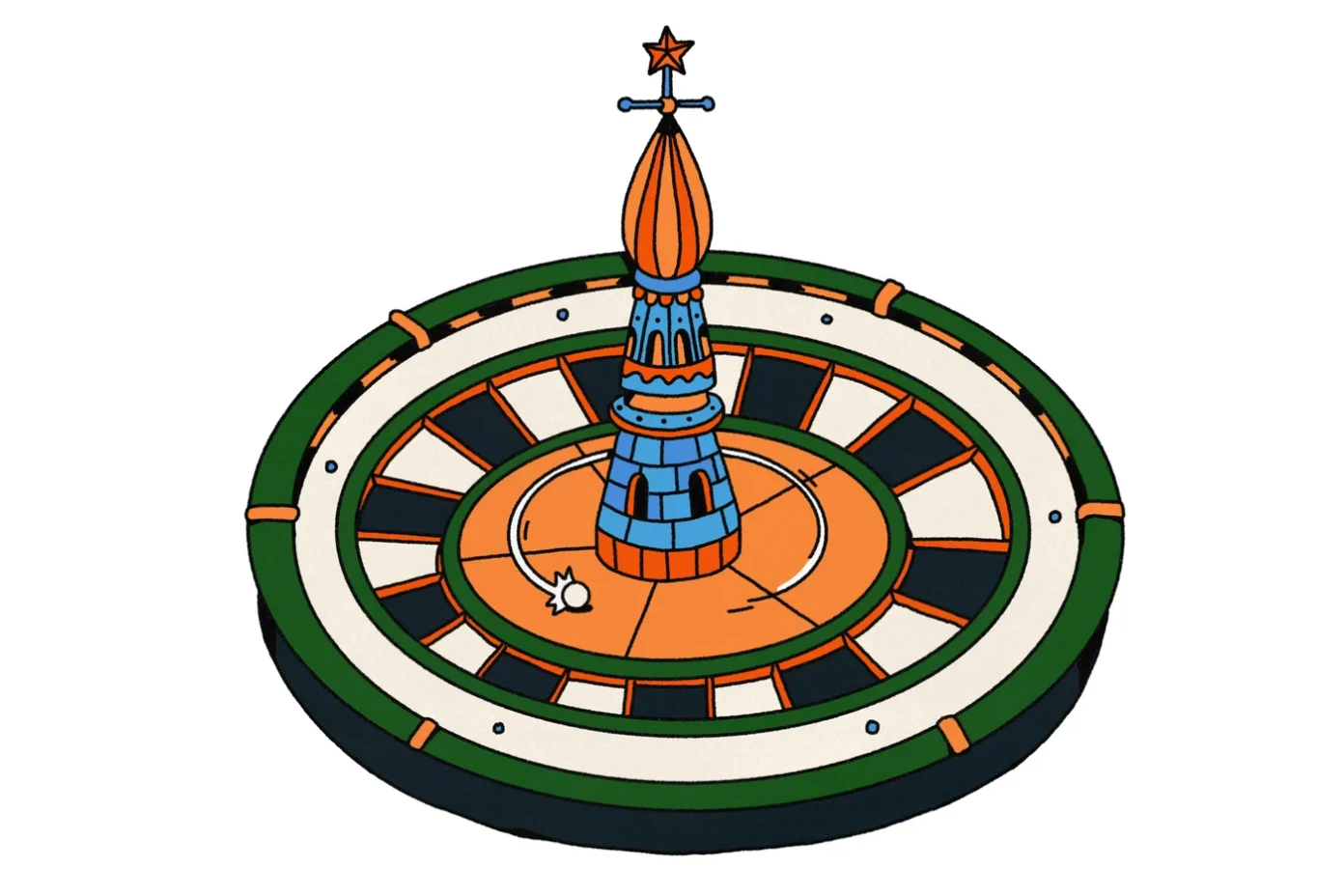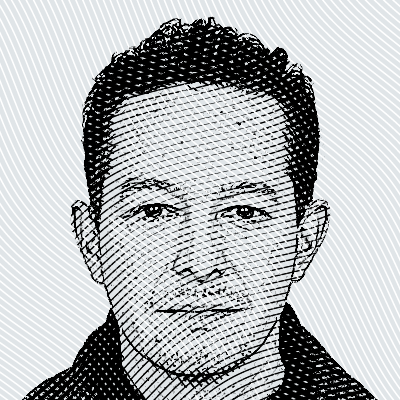David Davidson, Henk Willem Smits, Remy Koens | Follow The Money
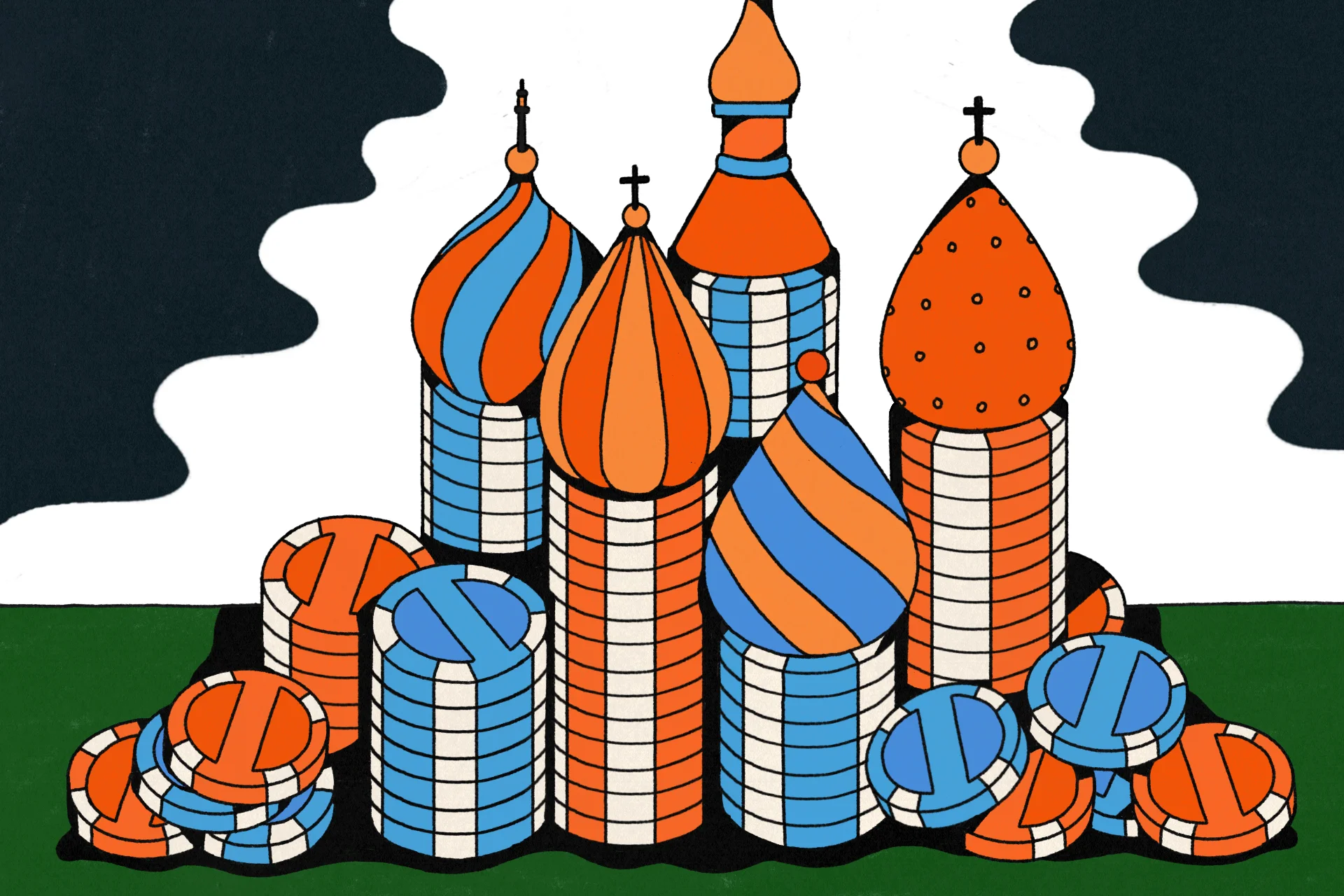
The originally Russian gambling company 1xBet operates worldwide through more than a thousand websites, both legal and illegal.
Newly surfaced documents show that the Netherlands fears damage to its international reputation due to companies like this one which operate under a Curaçao gambling licence. Follow the Money followed 1xBet’s data trails and charted the scale of the secretive gambling empire.
This article in 1 minute
- Gambling company 1xBet is one of the largest online casinos in the world. According to analysts, the company has a billion-dollar turnover.
- Besides regular currency, the company also facilitates gambling with crypto currencies. In an attempt to capture the scale of this, Follow the Money analysed over 250 cryptocurrency wallets involved in more than 3 million transactions, which together accounted for €4 billion.
- Follow the Money’s research shows that the company runs – directly and indirectly – more than a thousand gambling sites around the world. Using a ‘script’, we found networks running more than a thousand websites, some of which illegally target countries with strong gambling regulation authorities: European countries, the United States and Australia.
- 1xBet operates internationally under a gambling licence from Curaçao. Follow the Money’s investigation shows that the Netherlands is attracting attention for this and suffering major reputational damage due to the cowboy practices of the island’s huge gambling industry.
- The company has been put on the sanctions list by Ukraine for allegedly financially supporting Russia. Ukraine lists the Netherlands as the jurisdiction from which 1xBet operates.
‘The good name of the Kingdom (of the Netherlands) is at stake.’ Officials didn’t mince words in a 2020 memo to their boss, at the time Raymond Knops, state secretary for Kingdom Relations. The memo was about the thousands of internet casinos that have homes in Curaçao.
‘The online gambling sector is one of the biggest criminogenic and undermining factors on the island,’ the officials further write to Knops (CDA). ‘The online gambling sector does not care about the (il)legality of their conduct in the countries they target.’
According to a 2018 memo from the Gaming Authority: ‘In the case of this particular Curaçao export product (online gambling), it appears that the providers of that product largely do not comply with the laws and regulations of the host country, especially with regard to the required licences.’
‘A survey shows that this is the case at least in the Netherlands and in 11 other European jurisdictions (Belgium, Germany, Finland, France, Italy, Latvia, Lithuania, Norway, Spain, the Czech Republic and the UK) and also in the Australian jurisdiction New South Wales. It also appears that the US is being “served” from Curaçao, without complying with US federal or state laws and regulations.’
The above quotes are from various documents obtained after invoking the Open Government Act (‘Wet open overheid’ or ‘Woo’).
FC Barcelona
One of the best-known sports betting and casino games providers operating under a Curaçao licence is 1xBet. Analysts agree that 1xBet has a multi-billion-dollar turnover and is one of the largest (if not the largest) online casinos in the world.
This makes the company a major factor in the general dissatisfaction with Curaçao’s casino policy. It is also internationally known for its difficult relationship with regulations. Earlier, Follow the Money discovered that 1xBet-related gambling sites appear most often on international regulatory blacklists: a total of almost 1,800 website addresses in all kinds of name variants.

Although 1xBet is not licenced in the Netherlands, as in many other countries, you still often see the name popping up on Dutch television. This is because 1xBet has sponsorship deals with the Italian football league Serie A, the Spanish La Liga, the Africa Cup and the teams FC Barcelona and Paris Saint-Germain.
This is how the company builds brand awareness and generates trust, while operating unregulated or even illegally in many markets.
Behind a façade of partnerships with renowned football clubs hides an empire that cannot be contained – an opaque empire that is difficult to see and map out. To find out more about the size and activities of 1xBet, Follow the Money spent some time following the company’s data trails. These traces led to hundreds of websites hosted from Amsterdam, and to virtual wallets where 4 billion euros in crypto coins flow through.
These tracks led in many directions, including to Amsterdam and to virtual wallets through which 4 billion euros in crypto currencies flowed. Because you can also gamble with bitcoins at 1xBet.
Ukraine sanctions list
Gambling companies usually pledge their commitment to ‘responsible gaming’, but 1xBet does not seem to bother with this. ‘Players with gambling addictions are being abused,’ says Curaçao-based lawyer Roel Bijkerk, who helps people who have lost a lot of money at 1xBet. ‘I know one person who lost a million euros worth of bitcoins.’
‘Lost a million euros worth of bitcoins’
Lawyer Bijkerk tried to claim money back on behalf of a group of clients who were duped by 1xBet. ‘There was absolutely no response to that claim, let alone payment.’ He then asked for the bankruptcy of 1xBet’s parent company in Curaçao: the letterbox firm 1xCorp. This year, the bankruptcy became final after the Supreme Court ruled in the Netherlands.
However, typical of the gambling company’s elusiveness – and to Bijkerk’s frustration – 1xBet then proceeded to operate at the exact same address in Willemstad through another letterbox firm called Acom Latin America NV, while punters who saw their assets disappear have still not seen a penny from 1xBet.
The victims of 1xBet who are coming forward come from all over the world. ‘From Argentina to Russia to the Netherlands, but also African countries,’ says Bijkerk.
Until recently, 1xBet even operated in Ukraine, leading to a scandal that President Zelensky had to get personally involved in. Indeed, there are those in Ukraine that suspect Russia is profiting from the revenues of the gambling company with Russian roots.
Ukraine has now put 1xBet and its Curaçao companies on a sanctions list. And what is notable is the jurisdiction that Ukraine lists as 1xBet’s current home port: The Netherlands.
Curaçao gambling problems end up in the Netherlands
The situation in Curaçao is unique: the gambling licences which can be used internationally by online gambling companies are not issued by the government, but by a handful of companies. There is no form of state supervision. Meanwhile, these companies have issued thousands of sublicences to letterbox firms managed by Curaçao trust offices.
1xBet also got its licence from one of the ‘master licensees’: Cyberluck. Follow the Money has approached Angelique Snel-Guttenberg, CEO of Cyberluck, by email, but we have so far received no response to our questions.
Curaçao itself does not seem to have benefited much from this situation. The documents obtained by Follow the Money state: ‘It is unclear exactly how much turnover the sector generates, but what is clear is that almost none of that turnover flows into the state treasury or benefits Curaçao society.’
More than a thousand sites in two hundred countries
The gambling company runs its own online gambling houses under a limited number of brand names. Other variations, such as 1xStavka for the Russian market and 1xBit for crypto gambling, are clearly recognisable as part of the 1x family. Follow the Money also found more than 50 networks, which at first glance appear to have nothing to do with 1xBet: they use a different brand name, have their own design and are in the name of other legal entities that on paper have nothing to do with 1xBet.
But the software these sites use gives away that they belong to the 1x network. Follow the Money created a script which could check to see whether certain files on a website were being hosted in the expected place. We then unleashed that script onto any website that was blacklisted by a gaming authority. If a 1xBet logo or other promotional material was found, the script would track it.
These networks collectively run more than a thousand websites, which target more than two hundred countries. What is striking is that it is mainly the brands operating in areas which are regulated by relatively strong gambling authorities: European countries, the United States and Australia. Official 1xBet websites, by contrast, only allow gamblers from other parts of the world to register.
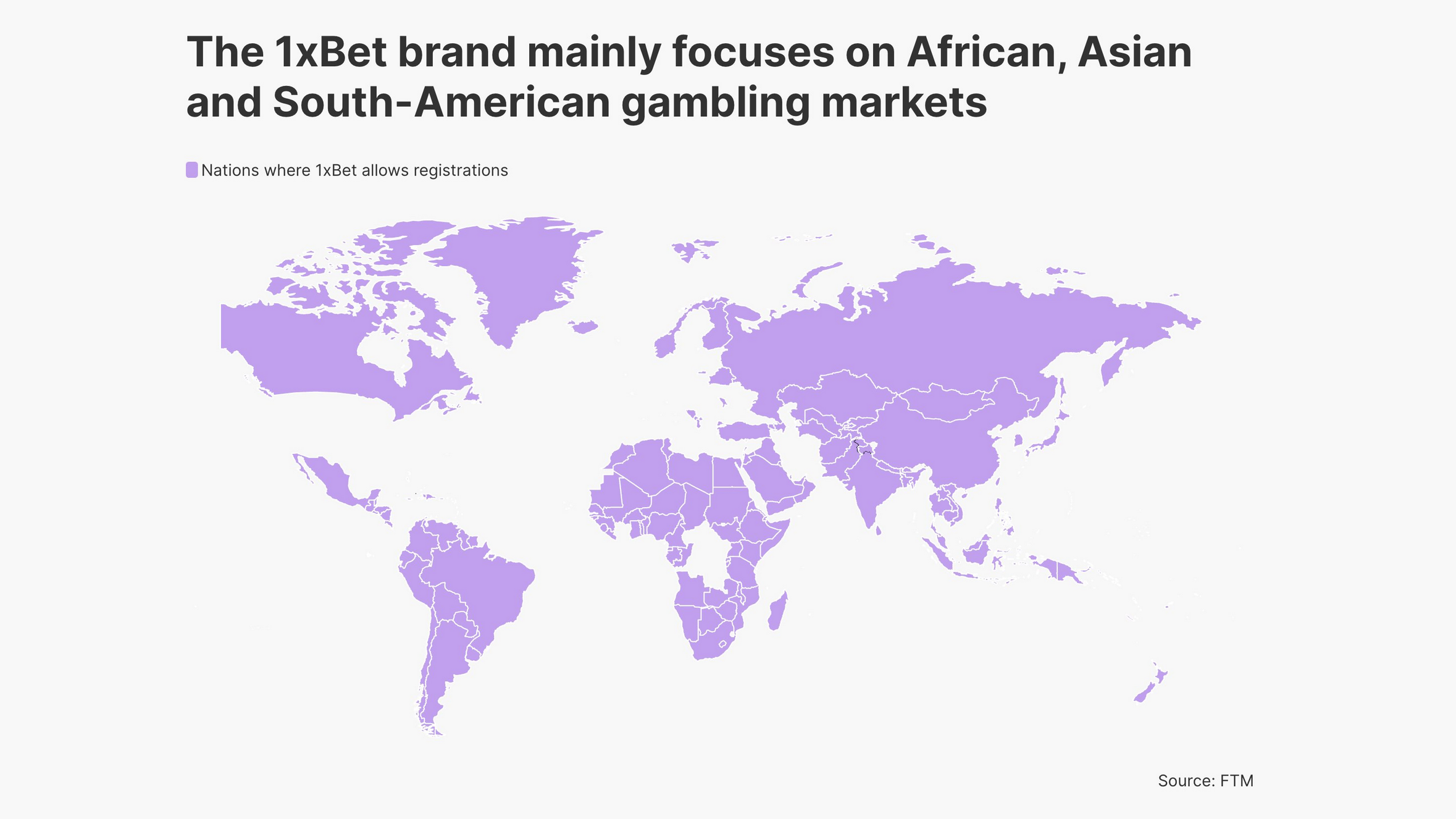
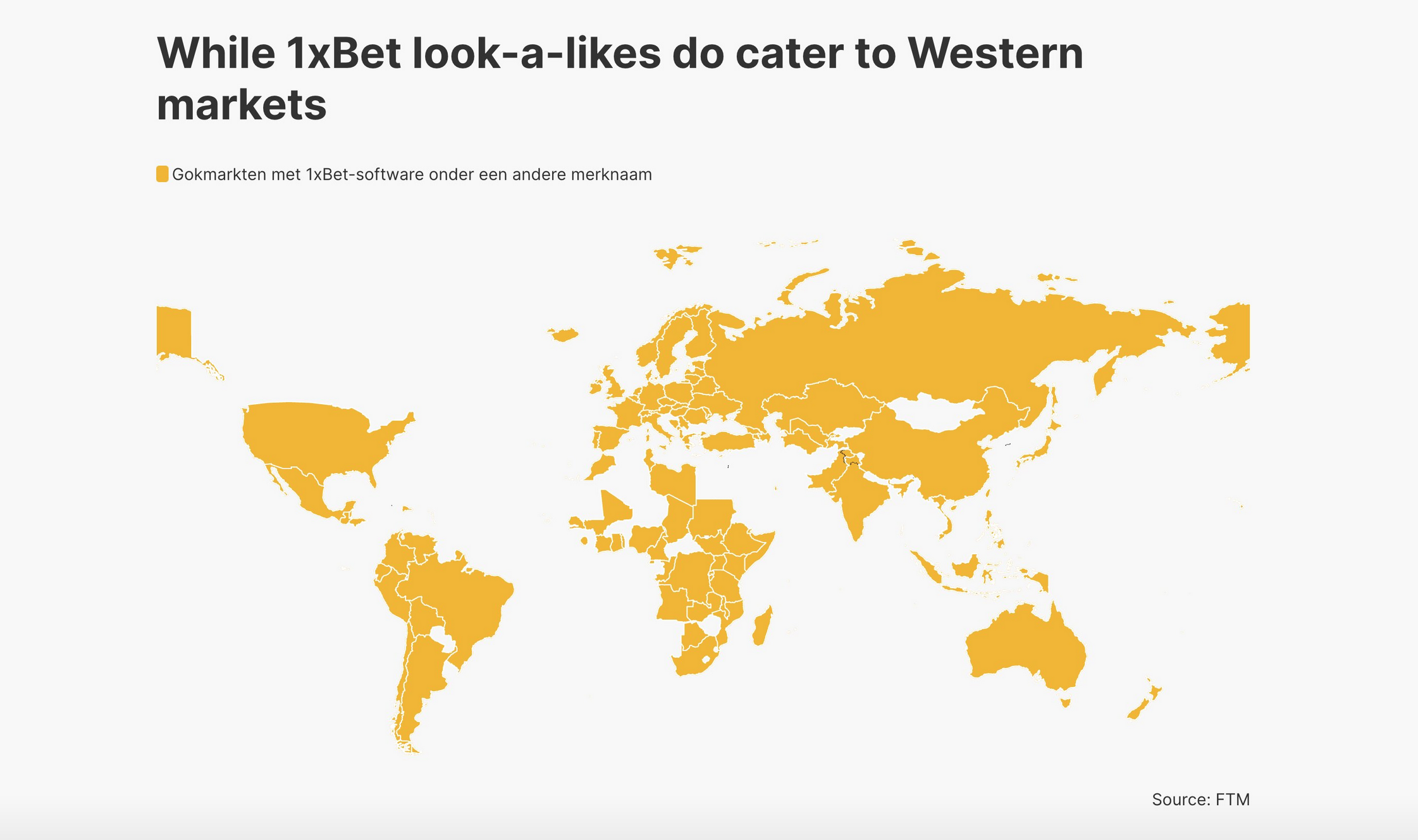
Anonymous gambling with crypto coins
Next to the Tesla dealership in Amsterdam Zuidoost, not far from the Johan Cruijff Arena, there is a warehouse upon which it says in large letters ‘Datacenter.com’. This is part of a global hosting provider. Hundreds of variations on 1xBet.com (sites that redirect to one of 1xBet’s gambling portals and brands such as 22bet, Coinplay and Betwinner) use an IP address that can be traced to servers in this warehouse in Amsterdam-Zuid.
This also applies to 1xBit. This cryptocurrency wallet is in high demand, according to an analysis carried out by Follow the Money. We used special software to identify crypto wallets and discovered over 250 of them. These digital wallets for cryptocurrencies were involved in more than 3 million transactions, totalling €4 billion in value. Transactions regularly took place to and from so-called mixers. One such mixer was Tornado.Cash, which has been linked to money laundering due to their further anonymisation of the origin of crypto coins.
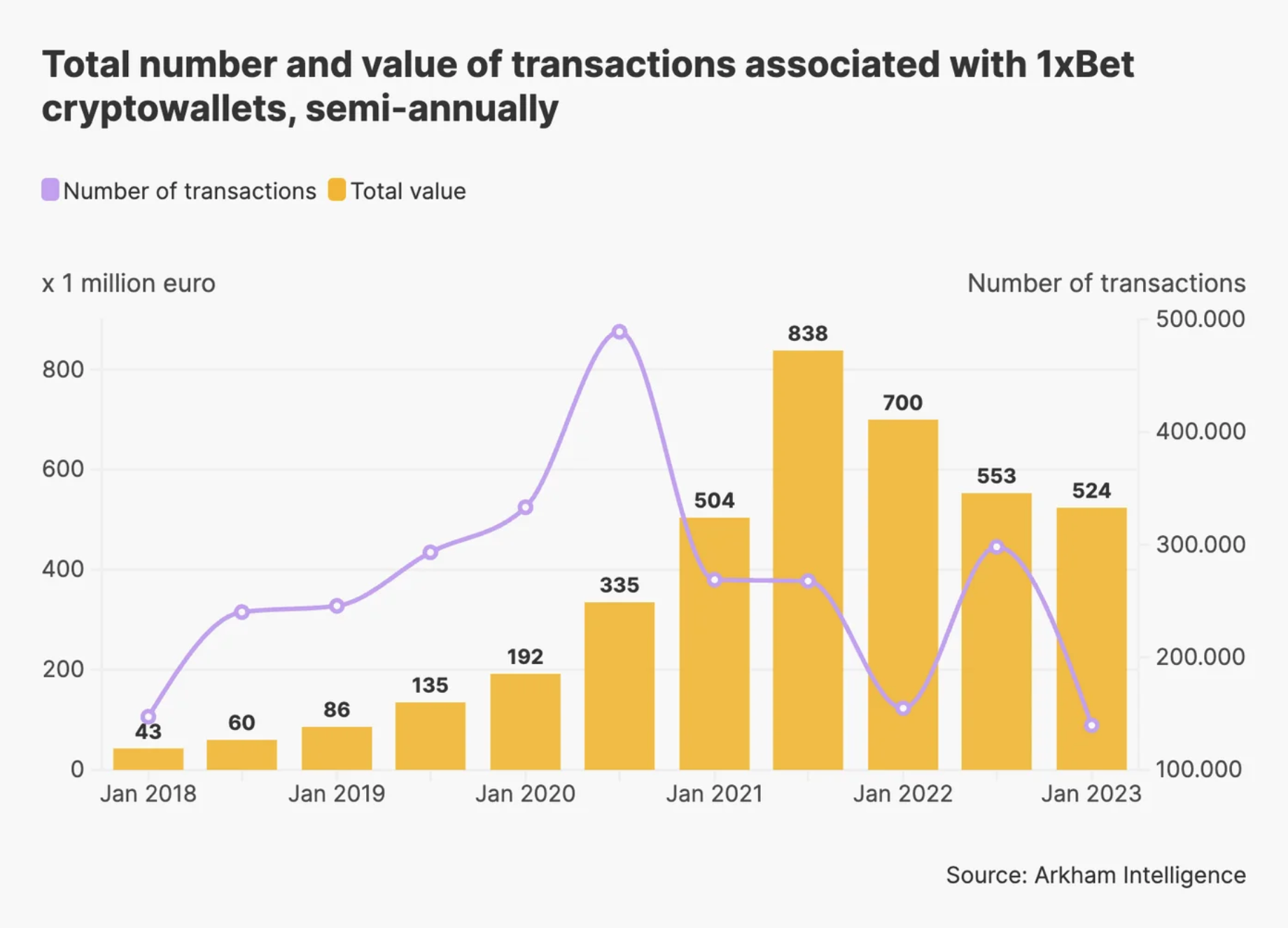
Datacenter.com says it does not know whether or not their facilities are being used for any wrongdoing. ‘Datacenter.com is a wholesale carrier-neutral data centre provider,’ explains general manager Oleksandr Kadyshev. ‘In general, we are not aware of our customers’ network operations, as network services are completely outside our scope.’
Shadowy corporate structure
Not only is 1xBet’s global network of websites shrouded in mystery, but so is the company structure itself. Hardly anything can be found in public documents about who the ultimate beneficial owners (UBOs) are, which companies are associated with 1xBet, or where the money flows to.
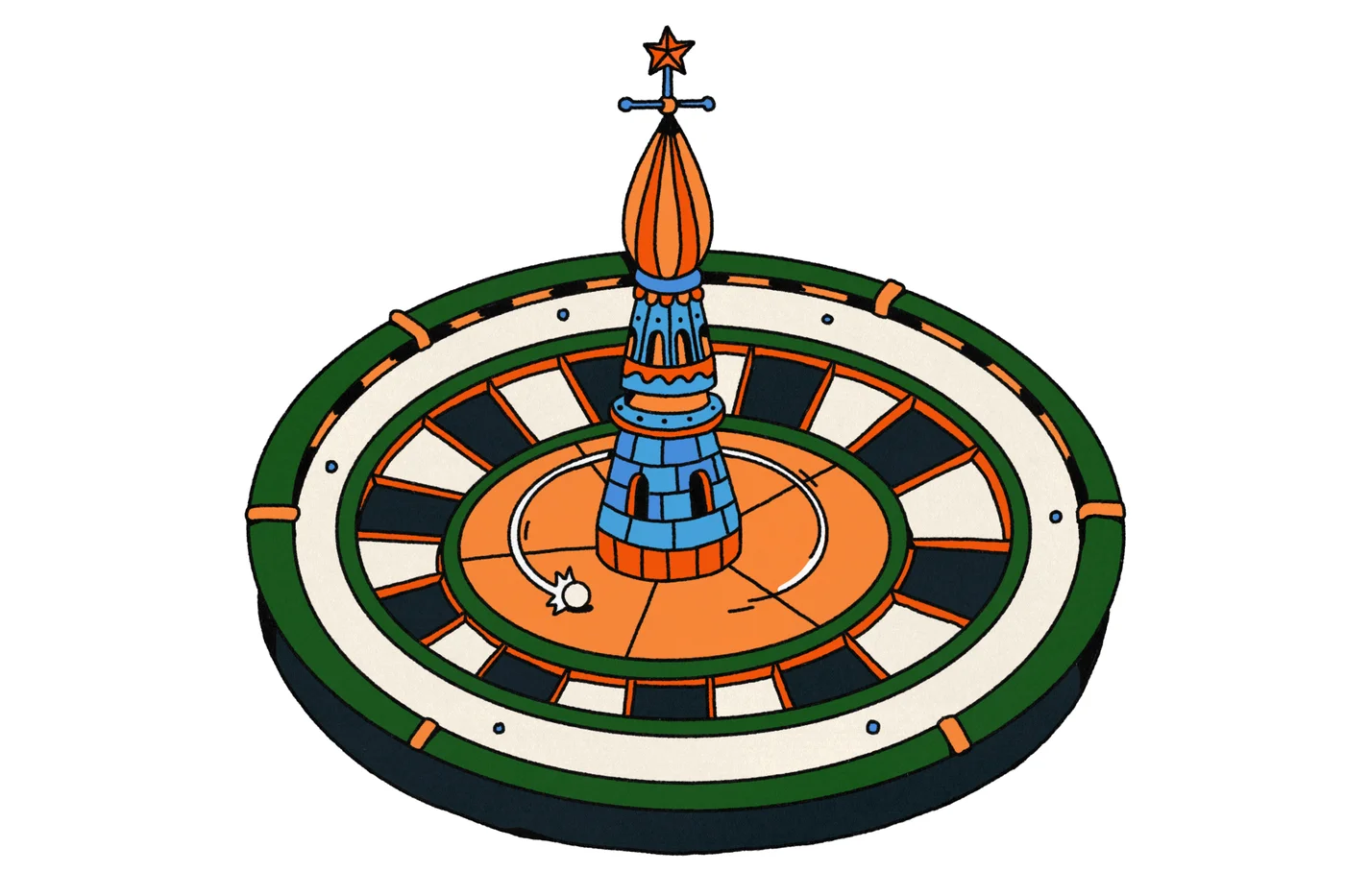
However, a Russian court judgement from 2021 that Follow the Money has in its possession does offer some insight into the company. In Russia, 1xBet was the subject of criminal investigations after it had made many millions from illegal gambling operations between 2014 and 2019. In the court case, the manager of a local branch of 1xBet was convicted.
1xBet founders Semiokhin, Karshkov and Kazorin were also suspects in this case. In an interview with Russia’s Forbes, Semiokhin, speaking from Cyprus, denied the allegations. According to him, there was no base for the alleged amounts and ‘no investigation had been carried out’.
Documents and witness statements quoted in the judgement reveal that Kazorin was the owner of 1xBet’s now bankrupt Curaçao letterbox firm 1xCorp N.V. According to the judgement, this firm is also named in agreements linking 1xBet to international payment systems. Kazorin allegedly signed these agreements on behalf of the Curaçao company.
Another company that appears in the judgement is Techinfusion Limited, which organises illegal gambling from Gibraltar and banks with Valartis Bank in Liechtenstein. According to the judgement, Techinfusion was set up by 1xCorp in Curaçao and money went through an intermediary channel from Techinfusion to companies in Cyprus and elsewhere, all of which were owned by Semiokhin.
Untenable situation
At the Hague ministries, officials have been racking their brains about how to deal with ‘Curaçao-based’ companies like 1xBet for years. Documents obtained through the Open Government Act show that criminal proceedings were already being discussed in 2018, as well as the possibility of working with regulators from other countries to shut down illegally operating websites. Targets were designated as gambling sites that had already been fined by the Gaming Authority, such as 1xBet.
But no action was ever taken. And in five years, no one has succeeded in getting Curaçao to intervene, pass better legislation or even implement some form of supervision. ‘The local authorities are not necessarily inclined to act against online gambling providers who violate laws and regulations of overseas jurisdictions,’ says a 2018 memo with bureaucratic understatement.
Meanwhile, the Curaçao government says it is aware of the seriousness of the situation. Following news from Follow the Money about Curaçao-based gambling companies being put on the Ukrainian sanctions list, it even spoke of an ‘untenable situation’. Curaçao’s finance minister Javier Silvania announced that he was drafting a new law.
Whether it will be effective has yet to be seen. The island is an independent country within the Kingdom of the Netherlands and sets its own rules. For now, the Netherlands ‒ and the rest of the world ‒ will have to continue dealing with 1xBet.
Bron: Follow The Money
Naschrift KKC
Lees ook: Blog Koninkrijksbelangen | Masterlicenties over de illegaliteit van Curacaoseonline gok masterlicenties.
Lees ook: Blog Koninkrijksbelangen | Sublicenties over de illegaliteit van Curacaoseonline gok sublicenties.
Lees ook: Koninkrijksbelangenblog | Witwaswalhalla over witwassen met behulp van een niet op de wet gebaseerde en niet door de overheid gereguleerde online gambling masterlicentie – sublicentie structuur.
Lees ook: Koninkrijksbelangenblog | Waar zijn de miljarden van Curacao? over belastingontduiking met behulp van een illegale en ongereguleerde online gambling masterlicentie – sublicentie structuur.
Overzicht: het Curacao Goksector dossier
Verdieping: De Koninkrijksbelangen blogserie
